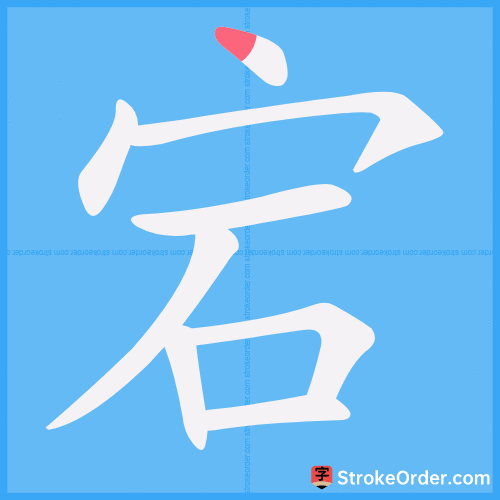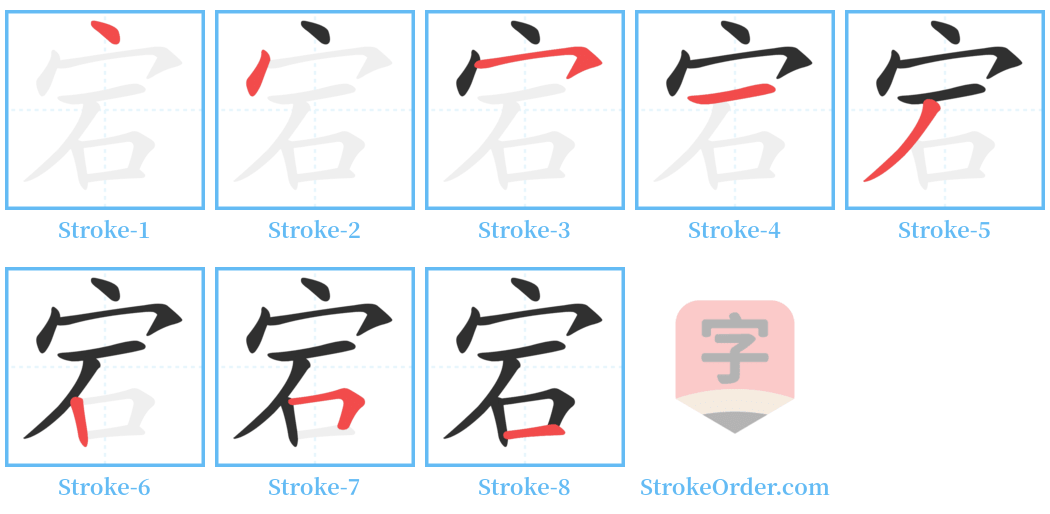宕 Stroke Order
Animated Stroke Order of 宕

Stroke Order Diagrams for 宕

Step-by-Step Handwriting Guide for 宕

Learn to Write Chinese Characters with Video Tutorials
Watch the video of writing the Chinese character "宕", learn the correct stroke order (笔顺) of the character "宕", and master the standard way of writing the character "宕".
Free Printable Handwriting Practice with Stroke Order: 宕
Printable Writing Practice Worksheet of "宕" in Portrait Orientation (Tian Zi Ge)

Printable Writing Practice Worksheet of "宕" in Landscape Orientation (Tian Zi Ge)

Information of 宕
Pinyin
dàng
Radical
宀
Strokes
8 strokes
Usage
★★★★
Definition
dissipated / put off
宕 [dàng]
Meaning:
1. Procrastinate; put on hold.
Example: 宕欠, 宕账 (debts that are delayed in repayment), 延宕 (to be delayed).
2. Indulgent; unrestrained.
Example: 流宕 (wandering), 宕逸 (carefree and unrestrained).
Noun:
1. Cave; cavern. ([En.] cave)
2. Extended to mean open or dim.
3. Pit. ([En.] pit)
Verb:
1. Pass through; go through. ([En.] pass)
2. Extended to mean loafing; wandering. ([En.] loaf about)
3. Indulge; unrestrained. ([En.] indulge)
4. To droop; to hang down. ([En.] droop)
5. Procrastinate. ([En.] procrastinate)
Discussion:
1. According to the Shuowen Jiezi: 宕 means to go past. Another interpretation is cave or cavern. It originates from a roof radical (宀) and the phonetic part (碭). It is noted that since the character contains the roof radical, its original meaning relates to an open space or cave that is not obstructed.
2. Example: 宕冥 (boundless sky; dull and dim).
3. Example: 宕户 (workers in stone quarries); 宕匠 (stonemasons).
Verb (further details):
1. Pass through; (interpreted from the text).
Example: In "Lies of the Immortals": Someone searched for a dog and passed through the immortal cave.
2. Extended to mean loafing; wandering. ([En.] loaf about)
Example: From "Popular Literature"—someone looks back and is said to be "宕".
Example: From "Guliang Zhuan—Wengong Year 11": The three brothers of Chang Di wandered in the land of China.
3. Lending indulgence and unrestrained behavior.
Example: From "Jinshi—Biography of Ji Ru": Characterized as indulgent and not minding minor matters.
4. To droop; to hang down.
Example: 如:宽皮宕肉 (loose meat that hangs down).
5. Procrastinate.
Example: 不许宕过年 (not allowed to procrastinate until the New Year); 宕账 (debts that have not been repaid).
Additional Meaning:
3. 宕昌, a place name, in Gansu.
Input Method for 宕
Pinyin
dang4
Wubi
pdf
Cangjie
jmr
Zhengma
wdg
Four Corner
30602
Unicode
U+5b95
Same Pronunciation Characters